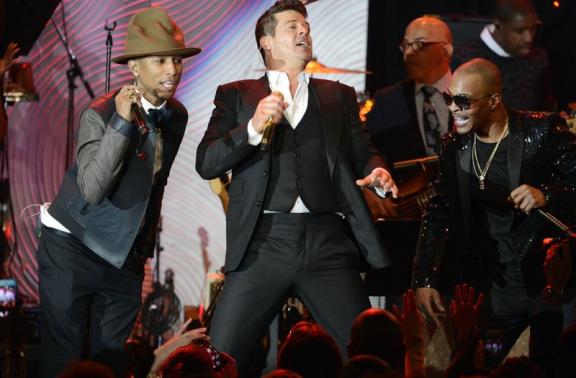Recording stars Robin Thicke and Pharrell Williams will contest the $7.4 million (4.96 million pounds) jury verdict that found they plagiarized Motown soul great Marvin Gaye in creating their hit single "Blurred Lines," the duo's lawyer said on Wednesday.
A day after the judgement, attorney Howard King said Thicke and Williams remained adamant that "Blurred Lines" was an original song created solely by them, adding that jurors were apparently convinced otherwise by expert testimony which should have been inadmissible.
The U.S. District Court jury in Los Angeles sided with Gaye's heirs on Tuesday in finding that parts of his 1977 hit "Got to Give it Up" were lifted by Thicke and Williams for their 2013 R&B chart-topper.
The jury awarded Gaye's children $4 million in actual damages plus $3.4 million in profits that Thicke, 38, and Williams, 41, were found to have derived from their copyright infringement.
The case, which explored the sometimes fuzzy boundary between artistic inspiration and theft, marked one of the highest-profile musical plagiarism lawsuits since George Harrison's rock ballad "My Sweet Lord" was found to have been copied from the Chiffons' hit "He's So Fine."
Despite magazine interviews in which Thicke had admitted to drawing from the feel of "Got to Give it Up" when composing "Blurred Lines," he and Williams have insisted they never copied from Gaye's song itself.
"Based upon their own feelings that they created 'Blurred Lines' from their own hearts and souls and no one else, and based on feedback from other prominent songwriters, (Thicke and Williams) feel they owe it to the creative world to make sure this verdict does not stand," King said.
King said he would seek a retrial if the judge denies a motion requesting the verdict be set aside. Otherwise, King said, Thicke and Williams would appeal the judgement.
King cited as grounds for contesting the verdict expert testimony given by a musicologist that he said compared "Blurred Lines" with "Got to Give it Up" based on elements of Gaye's song that were absent from the original sheet music.
At the time of its copyright, only the written music could be registered as protected, not sound recordings. "Clearly the jury relied on what that expert said in reaching their conclusion," King said.
The Gayes' lawyer, Richard Busch, could not immediately be reached for comment. On Tuesday, he said they would seek a court injunction against further distribution of "Blurred Lines" based on the verdict.


















































